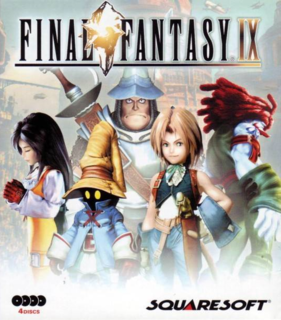An a amazing RPG, One of the best Final Fantasy ever made!
n history, no epic war has ever been fought without smaller battles, thus they remain as being one of the most important elements of the series. Once more, the battle system has been altered and tweaked - building on the strengths of games past. Instead of the now-standard three-man approach, Final Fantasy IX has reverted back to the four-man set-up seen in some of the earliest chapters in the series. Fighting is executed using the active-time approach (which can be switched to turn based via the configuration menu). This refers to the AT bar beside your character's name which, when filled, allows your character to perform an action. While essentially all battles are turn based, enemies will not wait for you to attack them if their AT fills up before yours. This is where the strategy kicks in; choosing which characters attack the fastest and which you can afford to save up for bigger attacks. To see a good demonstration of what not to do in battle, try leaving the game unpaused while you answer the phone; it's merciless.
The summoning ability has also returned, but is present more so for the sake of the plot rather than battle. For the most part, these 'eidolons' will be used against your party depicted through an impressive display of full motion video sequences to ever grace an RPG. You can use them as well, only a couple of your characters will actually have the ability to summon an elemental monster. The huge amount of MP needed to do this, however, will cause you to think twice. Finally, another new addition to fighting is the 'trance' bar. As your character inflicts damage, the bar fills and (once you've been knocked around enough) transforms your character in 'trance mode'. Similar to the Limit Break system introduced in Final Fantasy, this 'rage meter' allows your character to access powerful skills and abilities which lay dormant until provoked. While I find this feature effective for boss encounters, it's hard to strategically implement its timing during standard monster battles. As with the gameplay, the Fantasy series has always been scrutinized for how their visual appeal. In this case, Final Fantasy IX has little to worry about. Graphically, what the previous editions on PlayStation games established as exemplar has been harnessed to a tee by its successo. Each town and dungeon is so expertly rendered that you will more than once feel guilty about running through an area without spending at least a good half-hour to see the detail which has gone into the backgrounds. Even those who aren't primarily intrigued to style and savviness will marvel at the amount of ingenuity and thought that has gone into the town architecture and lush, complex outer environments. You could honestly frame any scene from this game and not feel like a geek for having it on your wall - Final Fantasy IX is truly a delight to look at. The character animations are clean and well defined, blending in perfect harmony with the battle backdrops and various enviroments. Finally, the cinematic sequences are yet another element of excellence, retaining the Hollywood inspired action and cinematic dynamics; truly the best that's been expressed on the PlayStation to date.
Sound is the integral feature to enriching the RPG experience, and in the case of Final Fantasy IX, it remains one of the areas that never really excites or disappoints. To its credit, Final Fantasy IX contains a vast number of themes for individual locations. Unfortunately, after you've heard them over and over, it grows to a point that you tend to overlook them...instead of being captivated. One area where I would've liked to see Square add dynamic appeal, being this is the last chapter for PlayStation One involves the integration of actual voices within the cinematic sequences or even in-game scenes (as featured in Grandia 2). As it is, FMV's are packed with sound effects and music and in-game events are driven through by the tradition text-message fashion. Some day, Square will hopefully change this aspect. In retrospect, even without the use of voice acting, the music complements all. In fact, the soundtracks always do well commercially. The only real letdown is that you don't get the feeling of a whole orchestra, but that of a guy sitting down with a synthesizer and a computer.
Square's last Final Fantasy title for the PlayStation is not only the best in the series, but quite possibly one of the best RPG's to bless the system.

